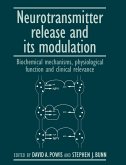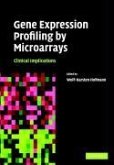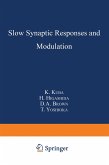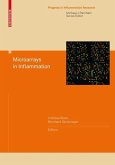G. Eric Blair / Craig R. Pringle / D. John Maudsley (eds.)
Modulation of Mhc Antigen Expression and Disease
Herausgeber: Blair, G. Eric; Maudsley, D. John; Pringle, Craig R.
G. Eric Blair / Craig R. Pringle / D. John Maudsley (eds.)
Modulation of Mhc Antigen Expression and Disease
Herausgeber: Blair, G. Eric; Maudsley, D. John; Pringle, Craig R.
- Broschiertes Buch
- Merkliste
- Auf die Merkliste
- Bewerten Bewerten
- Teilen
- Produkt teilen
- Produkterinnerung
- Produkterinnerung
The immune system plays a key role in the bodys defence against foreign agents like viruses and tumour cells. The major histocompatibility complex (MHC) genes are involved in this defence. Alteration of the expression of MHC genes has profound effects on the outcome of certain diseases (such as cancers, viral infections and autoimmune diseases like diabetes). This book explores how altered MHC expression can be explained at the molecular level, and how normal MHC expression can be restored by gene therapy and immunotherapy.
Andere Kunden interessierten sich auch für
![Neurotransmitter Release and Its Modulation Neurotransmitter Release and Its Modulation]() A. Powis / J. Bunn (eds.)Neurotransmitter Release and Its Modulation128,99 €
A. Powis / J. Bunn (eds.)Neurotransmitter Release and Its Modulation128,99 €![Antibody Engineering Volume 1 Antibody Engineering Volume 1]() Antibody Engineering Volume 1224,99 €
Antibody Engineering Volume 1224,99 €![Gene Expression Profiling by Microarrays Gene Expression Profiling by Microarrays]() Wolf-Karsten Hofmann (ed.)Gene Expression Profiling by Microarrays239,99 €
Wolf-Karsten Hofmann (ed.)Gene Expression Profiling by Microarrays239,99 €![The Mechanism of Human Facial Expression The Mechanism of Human Facial Expression]() Guillaume-Benjamin Amand DuchenneThe Mechanism of Human Facial Expression124,99 €
Guillaume-Benjamin Amand DuchenneThe Mechanism of Human Facial Expression124,99 €![Slow Synaptic Responses and Modulation Slow Synaptic Responses and Modulation]() Slow Synaptic Responses and Modulation38,99 €
Slow Synaptic Responses and Modulation38,99 €![Regulation of Cytokine Gene Expression in Immunity and Diseases Regulation of Cytokine Gene Expression in Immunity and Diseases]() Regulation of Cytokine Gene Expression in Immunity and Diseases112,99 €
Regulation of Cytokine Gene Expression in Immunity and Diseases112,99 €![Microarrays in Inflammation Microarrays in Inflammation]() Microarrays in Inflammation160,49 €
Microarrays in Inflammation160,49 €-
-
-
The immune system plays a key role in the bodys defence against foreign agents like viruses and tumour cells. The major histocompatibility complex (MHC) genes are involved in this defence. Alteration of the expression of MHC genes has profound effects on the outcome of certain diseases (such as cancers, viral infections and autoimmune diseases like diabetes). This book explores how altered MHC expression can be explained at the molecular level, and how normal MHC expression can be restored by gene therapy and immunotherapy.
Hinweis: Dieser Artikel kann nur an eine deutsche Lieferadresse ausgeliefert werden.
Hinweis: Dieser Artikel kann nur an eine deutsche Lieferadresse ausgeliefert werden.
Produktdetails
- Produktdetails
- Verlag: Cambridge University Press
- Seitenzahl: 460
- Erscheinungstermin: 25. August 2005
- Englisch
- Abmessung: 234mm x 156mm x 25mm
- Gewicht: 693g
- ISBN-13: 9780521499217
- ISBN-10: 0521499216
- Artikelnr.: 21772856
- Herstellerkennzeichnung
- Libri GmbH
- Europaallee 1
- 36244 Bad Hersfeld
- gpsr@libri.de
- Verlag: Cambridge University Press
- Seitenzahl: 460
- Erscheinungstermin: 25. August 2005
- Englisch
- Abmessung: 234mm x 156mm x 25mm
- Gewicht: 693g
- ISBN-13: 9780521499217
- ISBN-10: 0521499216
- Artikelnr.: 21772856
- Herstellerkennzeichnung
- Libri GmbH
- Europaallee 1
- 36244 Bad Hersfeld
- gpsr@libri.de
1. General introduction to the MHC Lynda G. Tussey and Andrew J. McMichael;
2. Organisation of the MHC Jiannis Ragoussis; 3. Interactions of cytokines
in the regulation of MHC class I and class II antigen expression Ian Todd;
4. Control of MHC class I gene expression Keiko Ozato; 5. Control of MHC
class II gene expression Jenny Pan-Yun Ting and Barbara J. Vilen; 6.
Modulation of MHC antigen expression by viruses D. John Maudsley; 7.
Modulation of MHC antigen expression by retroviruses Douglas V. Faller; 8.
Modulation of MHC class I antigen expression in adenovirus expression and
transformation G. Eric Blair, Joanne L. Proffitt and Maria E. Blair Zajdel;
9. MHC expression in HPV-associated cervical cancer Jennifer Bartholomew,
John M. Tinsley and Peter L. Stern; 10. Inhibition of the cellular response
to interferon by hepatitus B virus polymerase Graham R. Foster; 11.
Cellular adhesion molecules and MHC antigens in cells infected with
Epstein/Barr virus: implications for immune recognition Martin Rowe and
Maria G. Masucci; 12. Effect of human cytomegalovirus infection on the
expression of MHC class I antigens and adhesion molecules: potential role
in immune evasion and immunopathology Jane E. Grundy; 13. Oncogenes and MHC
class I expression Lucy T. C. Peltenburg and Peter I. Schrier; 14.
Mechanisms of tumour cell killing and the role of MHC antigens in
experimental model systems Roger F. L. James; 15. Manipulation of MHC
antigens by gene transfection and cytokine stimulation: a possible approach
for pre-selection of suitable patients for cytokine therapy Ame Nouri; 16.
Overexpression of MHC proteins in pancreatic islets: a link between
cytokines, viruses, the breach of tolerance and insulin dependent diabetes
mellitus? M. Vives-Pi, N. Somoza, F. Vargas and R. Pujol-Borrell; 17. The
role of cytokines in contributing to MHC antigen expression in rheumatoid
arthritis Fionula M. Brennan; 18. Expression of an MHC antigen in the
central nervous system: an animal model for demyelinating diseases Lionel
Feigenbaum, Taduru Sreenath and Gilbert Jay.
2. Organisation of the MHC Jiannis Ragoussis; 3. Interactions of cytokines
in the regulation of MHC class I and class II antigen expression Ian Todd;
4. Control of MHC class I gene expression Keiko Ozato; 5. Control of MHC
class II gene expression Jenny Pan-Yun Ting and Barbara J. Vilen; 6.
Modulation of MHC antigen expression by viruses D. John Maudsley; 7.
Modulation of MHC antigen expression by retroviruses Douglas V. Faller; 8.
Modulation of MHC class I antigen expression in adenovirus expression and
transformation G. Eric Blair, Joanne L. Proffitt and Maria E. Blair Zajdel;
9. MHC expression in HPV-associated cervical cancer Jennifer Bartholomew,
John M. Tinsley and Peter L. Stern; 10. Inhibition of the cellular response
to interferon by hepatitus B virus polymerase Graham R. Foster; 11.
Cellular adhesion molecules and MHC antigens in cells infected with
Epstein/Barr virus: implications for immune recognition Martin Rowe and
Maria G. Masucci; 12. Effect of human cytomegalovirus infection on the
expression of MHC class I antigens and adhesion molecules: potential role
in immune evasion and immunopathology Jane E. Grundy; 13. Oncogenes and MHC
class I expression Lucy T. C. Peltenburg and Peter I. Schrier; 14.
Mechanisms of tumour cell killing and the role of MHC antigens in
experimental model systems Roger F. L. James; 15. Manipulation of MHC
antigens by gene transfection and cytokine stimulation: a possible approach
for pre-selection of suitable patients for cytokine therapy Ame Nouri; 16.
Overexpression of MHC proteins in pancreatic islets: a link between
cytokines, viruses, the breach of tolerance and insulin dependent diabetes
mellitus? M. Vives-Pi, N. Somoza, F. Vargas and R. Pujol-Borrell; 17. The
role of cytokines in contributing to MHC antigen expression in rheumatoid
arthritis Fionula M. Brennan; 18. Expression of an MHC antigen in the
central nervous system: an animal model for demyelinating diseases Lionel
Feigenbaum, Taduru Sreenath and Gilbert Jay.
1. General introduction to the MHC Lynda G. Tussey and Andrew J. McMichael;
2. Organisation of the MHC Jiannis Ragoussis; 3. Interactions of cytokines
in the regulation of MHC class I and class II antigen expression Ian Todd;
4. Control of MHC class I gene expression Keiko Ozato; 5. Control of MHC
class II gene expression Jenny Pan-Yun Ting and Barbara J. Vilen; 6.
Modulation of MHC antigen expression by viruses D. John Maudsley; 7.
Modulation of MHC antigen expression by retroviruses Douglas V. Faller; 8.
Modulation of MHC class I antigen expression in adenovirus expression and
transformation G. Eric Blair, Joanne L. Proffitt and Maria E. Blair Zajdel;
9. MHC expression in HPV-associated cervical cancer Jennifer Bartholomew,
John M. Tinsley and Peter L. Stern; 10. Inhibition of the cellular response
to interferon by hepatitus B virus polymerase Graham R. Foster; 11.
Cellular adhesion molecules and MHC antigens in cells infected with
Epstein/Barr virus: implications for immune recognition Martin Rowe and
Maria G. Masucci; 12. Effect of human cytomegalovirus infection on the
expression of MHC class I antigens and adhesion molecules: potential role
in immune evasion and immunopathology Jane E. Grundy; 13. Oncogenes and MHC
class I expression Lucy T. C. Peltenburg and Peter I. Schrier; 14.
Mechanisms of tumour cell killing and the role of MHC antigens in
experimental model systems Roger F. L. James; 15. Manipulation of MHC
antigens by gene transfection and cytokine stimulation: a possible approach
for pre-selection of suitable patients for cytokine therapy Ame Nouri; 16.
Overexpression of MHC proteins in pancreatic islets: a link between
cytokines, viruses, the breach of tolerance and insulin dependent diabetes
mellitus? M. Vives-Pi, N. Somoza, F. Vargas and R. Pujol-Borrell; 17. The
role of cytokines in contributing to MHC antigen expression in rheumatoid
arthritis Fionula M. Brennan; 18. Expression of an MHC antigen in the
central nervous system: an animal model for demyelinating diseases Lionel
Feigenbaum, Taduru Sreenath and Gilbert Jay.
2. Organisation of the MHC Jiannis Ragoussis; 3. Interactions of cytokines
in the regulation of MHC class I and class II antigen expression Ian Todd;
4. Control of MHC class I gene expression Keiko Ozato; 5. Control of MHC
class II gene expression Jenny Pan-Yun Ting and Barbara J. Vilen; 6.
Modulation of MHC antigen expression by viruses D. John Maudsley; 7.
Modulation of MHC antigen expression by retroviruses Douglas V. Faller; 8.
Modulation of MHC class I antigen expression in adenovirus expression and
transformation G. Eric Blair, Joanne L. Proffitt and Maria E. Blair Zajdel;
9. MHC expression in HPV-associated cervical cancer Jennifer Bartholomew,
John M. Tinsley and Peter L. Stern; 10. Inhibition of the cellular response
to interferon by hepatitus B virus polymerase Graham R. Foster; 11.
Cellular adhesion molecules and MHC antigens in cells infected with
Epstein/Barr virus: implications for immune recognition Martin Rowe and
Maria G. Masucci; 12. Effect of human cytomegalovirus infection on the
expression of MHC class I antigens and adhesion molecules: potential role
in immune evasion and immunopathology Jane E. Grundy; 13. Oncogenes and MHC
class I expression Lucy T. C. Peltenburg and Peter I. Schrier; 14.
Mechanisms of tumour cell killing and the role of MHC antigens in
experimental model systems Roger F. L. James; 15. Manipulation of MHC
antigens by gene transfection and cytokine stimulation: a possible approach
for pre-selection of suitable patients for cytokine therapy Ame Nouri; 16.
Overexpression of MHC proteins in pancreatic islets: a link between
cytokines, viruses, the breach of tolerance and insulin dependent diabetes
mellitus? M. Vives-Pi, N. Somoza, F. Vargas and R. Pujol-Borrell; 17. The
role of cytokines in contributing to MHC antigen expression in rheumatoid
arthritis Fionula M. Brennan; 18. Expression of an MHC antigen in the
central nervous system: an animal model for demyelinating diseases Lionel
Feigenbaum, Taduru Sreenath and Gilbert Jay.








